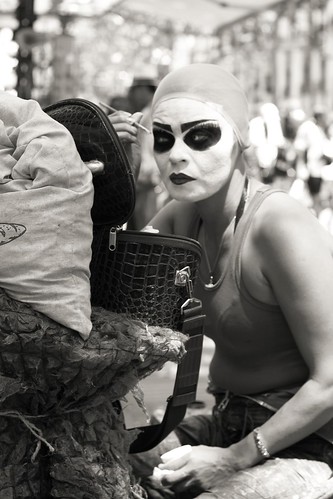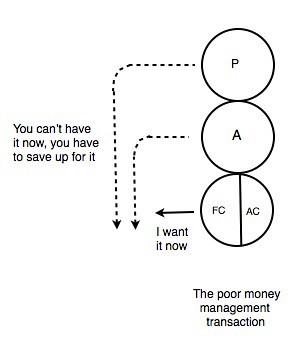The DSM-5 includes gambling addiction in the substance-related and addictive disorders along with the drug and alcohol addictions. Whilst this could be seen as a widely held belief that gambling should be included in such a category along with drugs and alcohol it does have some difficulties.
Firstly, in my book I see the dependent drug user as having an attachment problem and this get transferred onto the drug and the person develops an attachment to the drug in the same way they develop an attachment to mother or father.
The person forms a symbiosis with the drug where the drug takes over the Parent (and to a lesser extent Adult) ego state functions. Most obvious is the soothing effects of the Parent ego state. Dependent drug users are notoriously poor at self soothing. Drugs are very effective at soothing the drug user.
In normal development a young child uses mother's Nurturing Parent ego state to soothe itself and then it learns to self soothe as it grows. Dependent drug users don't learn to do this and hence needs an outside 'thing' to do it for them and hence the drug fills that role.
In gambling there is no where near the same soothing effect. At the very best there may be a kind of mild soothing effect in the act of gambling for some but compared to the soothing that heroin can provide it is next to nothing. Hence the gambling addict does not form a symbiosis with the act of gambling in the same way a drug addict develops a symbiosis with the drug. Thus we see one very crucial difference between the gambling addict and the drug addict and why it could be seen as erroneous to include them in the same category as the DSM-5 does.
I am not saying that a gambling addiction should not be seen as an addiction. What I am saying is that such an addiction is significantly psychologically different to an addiction to drugs or alcohol and it needs to be recognized as such. And as a result one cannot use the same treatment methods for a gambling addiction as they use for a drug addiction.
One could argue that a gambling addiction is really a passive behaviour. As we know the four passive behaviors are:
Doing nothing
Over adaptation
Agitation
Violence or incapacitation
I am now going to contradict myself in what I said in gambling addition 1. In that post I said gamblers do not seek to form a symbiosis with another in the same way a drug addict does. The drug addict seeks to use another's Nurturing Parent ego state to self soothe whereas the gambling addict does not as gambling does not have the same soothing effect that drugs do.
Having said that, I now say that a gambling addiction could be seen as a passive behaviour and as we know the purpose of a person behaving in such a passive way is to form a symbiosis with another person. In my hypothesis the gambling addict has a very strong drive to do such a thing but in a different way to the drug addict.
A gambling addiction could be seen as a form of incapacitation. The person gets them self into a position where they are incapacitated and then some one else of some organization comes along and looks after them.
The gambling addict in essence does not manage money well. People who do not manage money well have an over active hedonistic Free Child that cannot be controlled by their Adult or Parent ego states.
As the transactional diagram shows the Parent and Adult are not strong enough to contain the Free Child want for the thing. I used this same diagram in my book to show how the recreational drug user functions. The recreational drug user can say to their own Free Child, “You have had enough now.” and the Free Child stops. The drug addict does not have that control over the Free Child. The same applies for the recreational gambler and the gambling addict. Indeed the same applies for any person who has high levels of credit card debt. They cannot control their Free Child want for the ‘thing’ now.

Graffiti


No comments:
Post a Comment